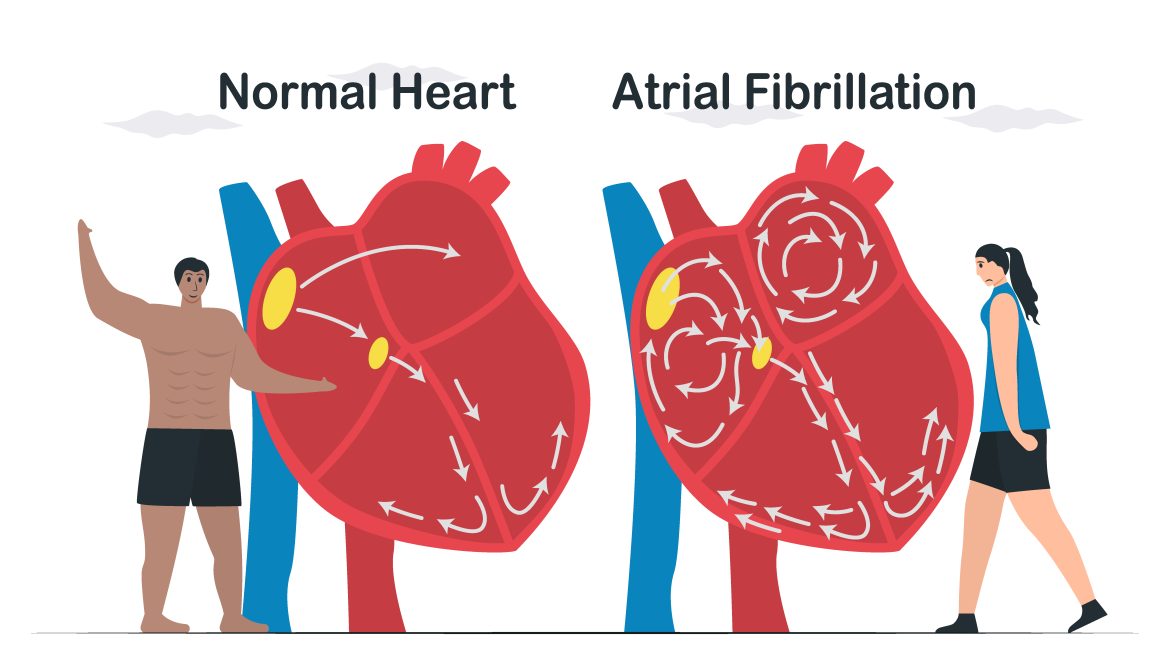
ATRIAL FIBRILLATION
- 09 May, 2023
- Posted by admin
- 0 Comment(s)
INTRODUCTION
Atrial fibrillation is a heart problem which is characterized by the rapid and irregular heart rate. It can lead to formation of blood clots in heart. In this, the upper chambers of heart known as atria, beat out of sync with the lower chambers of heart called ventricles. It causes fast pounding heartbeats, difficulty in breathing and fatigue. In some cases, it may have no symptoms at all. Atrial fibrillation increases the risk of stroke, heart failure, heart attack, etc.
Atrial fibrillation either occurs in episodes or may be persistent. It is not a life threatening condition but if not dealt properly, it can lead to serious health complications. The treatment includes several medications and therapies for resetting rhythm of heart. However, eating nutritious food and doing regular physical exercise are very beneficial in atrial fibrillation.
WHAT ARE THE DIFFERENT TYPES OF ATRIAL FIBRILLATION?
Atrial fibrillation is of three different types:
- Paroxysmal atrial fibrillation: It occurs less than a week and stops on its own.
- Persistent atrial fibrillation: It lasts for more than one week and requires medical attention.
- Long-standing persistent atrial fibrillation: It occurs for more than one year and is quite difficult to treat.
WHAT ARE THE CAUSES OF ATRIAL FIBRILLATION?
In atrial fibrillation, problem in structure of heart is the main cause of atrial fibrillation. However, there are various other causes of it.
Following are the several causes of atrial fibrillation:
- High blood pressure
- Congenital heart defect
- Coronary artery disease
- Problems in heart valves
- Heart attack
- Diseases of lungs
- Sleep apnea
- Any previous heart surgery
- Physical trauma
- Sick sinus syndrome
- Hyperthyroidism or hypothyroidism
- Viral infections
- Certain medications
- Intake of excessive caffeine
WHAT ARE THE RISK FACTORS OF ATRIAL FIBRILLATION?
Following are the risk factors which make a person more prone to atrial fibrillation:
- Increasing age
- Hypertension
- Having a genetic history of atrial fibrillation
- Congestive heart failure
- Metabolic syndrome
- Chronic kidney disease
- Lack of physical exercise
- Being overweight
- Excessive alcohol intake
WHAT ARE THE SIGNS AND SYMPTOMS OF ATRIAL FIBRILLATION?
In most of the patients, there are no symptoms of atrial fibrillation. But in some, the symptoms manifest. Following are the common signs and symptoms of atrial fibrillation:
- Pain in chest
- Feeling tired
- Increased heart palpitations
- Light-headedness
- Shortness of breath
- Extreme body fatigue
- Fainting
- Nausea
- Vomiting
- Feeling of tightness in chest
- Indigestion
- Heartburn
- Pain in the left arm
HOW ATRIAL FIBRILLATION CAN BE PREVENTED?
Atrial fibrillation can be prevented by taking some of the following steps:
- Doing regular physical exercise
- Eating a healthy diet
- Maintaining optimum weight
- Say no to smoking
- Quit alcohol
- Take less caffeine
- Yoga and meditation for stress management
HOW THE DIAGNOSIS OF ATRIAL FIBRILLATION IS MADE?
The doctor will do a physical examination of the patient through stethoscope. He will ask about the signs and symptoms of the disease to the patient. He will take the past medical history and family history of patient. He will recommend following tests to the patient:
- Blood tests
- ECG
- Holter test
- Echocardiogram
- Stress test
- Chest X-ray
MANAGEMENT OF ATRIAL FIBRILLATION WITH THE MEDICATIONS OF CHANDIGARH AYURVED CENTRE
Here are some of the medications of Chandigarh Ayurved centre which are used for the treatment of atrial fibrillation:
1. Detox Premium Powder
Detox premium powder is an ayurvedic formulation that is made up of Giloy satav, Akik pishti, Tal sindoor, Shankh bhasma, Shukta pishti, Parwal pishti, etc. This powder is very beneficial to protect the heart from various conditions. It can help in relieving the pain, discomfort, fainting, dizziness, and other associated symptoms.
Recommended Dosage – Take 1 sachet twice daily with normal water.
2. Kapha Balance Tablet
Kapha tablet is a healthy blend of herbs formulated to balance Kapha doshas without aggravating Pitta and Vata doshas. It can also be used to alleviate any temporary Kapha imbalance. It is very effective in Kapha season that is late winter and spring. It consists of warming and astringent herbs that help to balance the system throughout the cold season. The main use of Kapha tablets is to remove excess Kapha doshas from the system and helps in the management of weight, healthy lungs, and the immune system.
Recommended Dosage– Take 1 tablet twice daily with normal water.
3. Heart Up Tablet
Heart Up Tablet is a unique formulation and is very effective in the treatment of heart diseases and related symptoms. It acts as a cardioprotective and anti-arrhythmic medicine providing strength to the heart muscles and maintains heart rate. This medicine is very useful in relieving pain and maintains blood optimum viscosity.
Recommended Dosage– Take 1 tablet twice daily with normal water.
4. Garlic Capsules
This is purely Ayurvedic preparation. Garlic capsules shows anti-fungal, antioxidant, anti-microbial, immune-modulator properties. These capsules contains pure extract of garlic. This is effective in atherosclerosis, diabetes, high level of cholesterol, hypertension.
Recommended Dosage: Take 2 capsules twice daily.
5. Noni Capsules
Noni capsules are herbo mineral and purely ayurvedic formulation. Noni is a fruit found mainly in South India which contains many health benefits. Noni fruit is known for its high level of antioxidants like beta carotene, vitamin E, vitamin C and various other minerals which help to Strengthen the immune system. People suffering from Respiratory problems may benefit from this. Noni Capsules promotes immunity, Arthritis relief, circulation of blood, energy and digestive health. It contains standard extract of Morinda Citrifo. Noni capsules have anti inflamatory properties that help reduce inflammation of the body.
Recommended Dosage– Take 1 Capsule twice daily.
